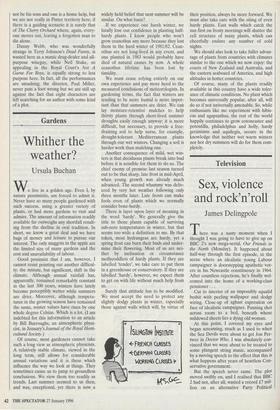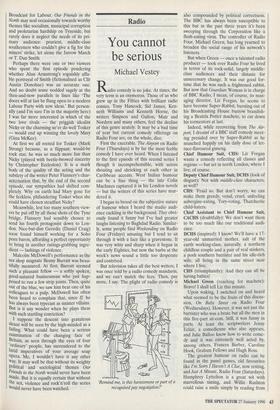Television
Sex, violence and rock'n'roll
James Dehngpole
There was a nasty moment when I thought I was going to have to give up on BBC 2's new mega-serial, Our Friends in the North (Monday). It happened about half-way through the first episode, in the scene where an idealistic young Labour campaigner is doorstepping apathetic vot- ers in his Newcastle constituency in 1964. After countless rejections, he's finally wel- comed into the home of a working-class pensioner ...
Cut to interior of an impossibly squalid bedsit with peeling wallpaper and dodgy wiring. Close-up of aghast expression on face of idealistic campaigner. Panning shot across room to a bed, beneath whose mildewed sheets lies a dying old woman.
At this point, I covered my eyes and began screaming, much as I used to when the Sea Devils were about to get Jon Per- twee in Doctor Who. I was absolutely con- vinced that we were about to be treated to some plangent string music, accompanied by a moving speech to the effect that this is what happens after years of heartless Con- servative government.
But the speech never came. The plot moved swiftly on, and I realised that BBC 2 had not, after all, wasted a record £7 mil- lion on an alternative Party Political Broadcast for Labour. Our Friends in the North may nod occasionally towards worthy themes like socialism, municipal corruption and proletarian hardship on Tyneside, but rarely does it neglect the needs of its pri- mary audience: prurient, middle-class southerners who couldn't give a fig for the miners' strike, let alone the Jarrow March or T. Dan Smith.
Perhaps there were one or two viewers who spent the first episode pondering whether Alun Armstrong's roguishly affa- ble portrayal of Smith (fictionalised as Cllr Austin Donohue) was an accurate one. And no doubt some nodded sagely at the then-and-now parallels in lines like 'The doors will at last be flung open to a modern Labour Party with new ideas.' But person- ally (and I'm sure I'm in the majority here) I was far more interested in which of the two love rivals — the priggish idealist Nicky or the charming ne'er do well Tosker — would end up winning the lovely Mary (Gina McKee).
At first we all rooted for Tosker (Mark Strong) because, as a flippant, would-be rock star, he was so much more fun than Nicky (played with beetle-browed sincerity by Christopher Eccleston). It is a mark both of the quality of the acting and the subtlety of the writer Peter Flannery's char- acterisation that, by the end of the second episode, our sympathies had shifted com- pletely. Why on earth had Mary gone for the feckless, philandering Tosker when she could have chosen steadfast Nicky?
Meanwhile, lest too many southern view- ers be put off by all those shots of the Tyne bridge, Flannery had sensibly chosen to send his fourth protagonist down to Lon- don. Nice-but-dim Geordie (Daniel Craig) soon found himself working for a Soho porn baron, affording a perfect opportunity to bring in another ratings-grabbing ingre- dient — lashings of violence.
Malcolm McDowell's performance as the sex shop magnate Benny Barratt was beau- tifully measured. At first, Barratt seemed such a pleasant fellow — a softly spoken, good-natured businessman who just hap- pened to run a few strip joints. Then, quite out of the blue, we saw him beat one of his colleagues to a pulp. McDowell has often been heard to complain that, since If he has always been typecast as sinister villains. But is it any wonder when he plays them With such startling conviction?
I suppose the descent into gratuitous sleaze will be seen by the high-minded as a failing. What could have been a serious examination of the changing face of Britain, as seen through the eyes of four ordinary' people, has surrendered to the lurid imperatives of your average soap Opera. Me, I wouldn't have it any other way. It may well be that without its weighty political and sociological themes Our Friends in the North would never have been made. But it is equally certain that without the sex, violence and rock'n'roll the series Would never have been watched.



























































 Previous page
Previous page